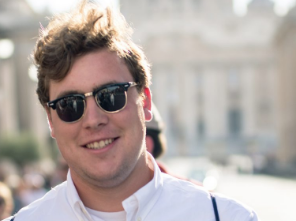McGlone ’18 to Study, Teach Latin in Rome with Paideia Fellowship


Brendan McGlone ’18, who’s on track to graduate in May with a triple major in classics, medieval studies and the College of Letters, will continue his post-Wesleyan education in Rome as a Paideia Institute for Humanistic Study Fellow.
The Paideia Institute is a nonprofit educational organization dedicated to promoting the study and appreciation of the classical humanities, with a focus on Latin and Ancient Greek languages and literature.
Paideia Fellows are selected on the basis of academic merit, personality, and potential as a future teacher of classics. Fellows teach American high school students Latin, and lead them on classics-themed tours around Rome and the Mediterranean. In addition, fellows work on independent research published in the blog “Loci in Locis.”
For his senior thesis at Wesleyan, McGlone is decoding and translating a late medieval manuscript collection of sermons housed in Wesleyan’s Special Collections & Archives.
“I hope to be able to continue with the type of research I am doing for my thesis, looking at the manuscript collections held in the Vatican Libraries or elsewhere in the city,” he said. “I also hope to use the year to figure out my future plans—perhaps grad school, perhaps teaching, perhaps something totally different.”
McGlone’s love for Latin originated in high school and was fostered at Wesleyan. He’s also a practicing Catholic and found studying Latin has broadened and deepened his religious understanding and experiences.
“I took a few classes with Professors Andy Szegedy-Maszak and Michael Roberts, two of the best teachers and scholars I’ve encountered at Wes,” McGlone said.
The summer after his sophomore year, McGlone participated in the Paideia Institute’s flagship program “Living Latin in Rome”—six weeks of intense study in and around Rome.
“The institute has a very different approach to the language: instead of treating it as a puzzle, where you memorize lots of forms and try to piece the words you see together based on their forms, we use it like a language, by reading, speaking, and writing it,” McGlone explained.
At Wesleyan, McGlone is captain of the ultimate frisbee team Throw Culture, and an accomplished bagpiper. But his main interest is keeping Latin alive. Although the Latin language died off as a spoken language in the 5th or 6th century AD, it morphed into Italian, French, Spanish, and other Romance languages.
“This is why I would say it is not a dead language,” he said. “It has been in continuous use in some form or another for nearly 3,000 years. People are still speaking it.”

